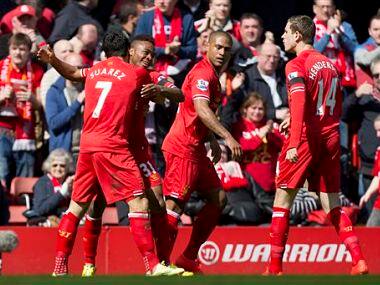Liverpool, the pundits suggested, would need to work hard to “channel their emotions” at Anfield on Sunday. The 25th anniversary of the Hillsborough tragedy has been put into sharper focus by a new public inquiry into those horrific events – and a greater sense of acceptance by the football community outside the city that Hillsborough was a watershed moment that has become a very big deal for English football. The fear was that Liverpool’s irresistible form of late might be negatively affected by the sentiment surrounding the anniversary; instead, they came at Manchester City in the early exchanges with all the dynamism, pace and skilful interchanges that have become their hallmark under Brendan Rodgers. Set up in their most dynamic formation – a midfield diamond with Raheem Sterling at the front – Liverpool went hard at the City back four, often ganging up in pairs to take on individual defenders. [caption id=“attachment_1478677” align=“alignleft” width=“380”]  Sterling set Liverpool off with a brilliant first goal. AP[/caption] Though Philippe Coutinho probably just shaded Sterling as Liverpool’s player of the match, it’s worth remembering that only five months ago young Sterling almost disappeared off to Swansea on loan. Few coaches would have transformed a supremely talented but still raw player in the way that Rodgers has, and in such a short time-span. On Sunday, while Liverpool’s three other midfielders tackled like demons and instigated the moves, Sterling was charged with finding space behind Fernandinho and Yaya Toure and running into goal-scoring positions. For the opening goal, Sterling did exactly that, and had the presence of mind to send both Vincent Kompany and Joe Hart the wrong way before burying his shot into the goal in front of the Kop. City had conceded only two goals in their previous seven league games but they are not among the quickest of teams in the Premier League and had already shown susceptibility to the counterattack when Chelsea won at the Etihad Stadium in February. One hugely significant issue in the game was the way each team defended corners. Liverpool, although operating on the edge of the law at times, resisted well. When the corners were at the other end, it was a different story. Steven Gerrard found himself in an ocean of space when planting his header directly at Joe Hart from six yards out, but Liverpool made amends with the next corner when Skrtel drifted wide of Kompany and from a tight angle beat Hart comfortably to make it 2-0. It was at this stage that Liverpool hit a flat spot in the game. They were fortunate when Mark Clattenburg chose not to give a penalty following Mamadou Sakho’s clumsy challenge on Edin Dzeko. And though they went into the break still with a two-goal cushion, things started to unravel in the second half. Manuel Pellegrini’s decision to send on James Milner in place of the unusually quiet Jesus Navas was a good one. Milner’s assist was converted by David Silva, and the change in formation meant Silva was playing in a free role now. The Spaniard then sent a devilish cross into the box which Glen Johnson deflected into his own net and suddenly it was 2-2. Anfield went quiet, but Liverpool were not cooked yet. They’ve been asked to pull off something special in the late stages several times this season and though Martin Demichelis continued to shackle Luis Suarez particularly well, most of the attacks over the final quarter of the game came from the men in red. A few times Liverpool were caught out by an efficient offside trap. But then Kompany, who was far from fully fit, missed a straightforward clearance and Coutinho swivelled and buried his shot with pace and accuracy beyond Hart. Could Swansea v Chelsea provide as much excitement? Unsurprisingly, no it couldn’t. The home team did their best to make it easy for Jose Mourinho’s men as Chico Flores got himself sent off ludicrously early. But Chelsea’s weakness in front of goal haunted them a long while. It was in the final quarter of the game that Demba Ba, a striker Mourinho has not got the most out of this season, finally broke the deadlock. Assuming Chelsea beat Sunderland, Norwich and Cardiff – arguably the three weakest teams in the league on form – then they would “only” need to beat Liverpool at Anfield on 27 April to snatch the title. Perhaps their biggest problem will be squad management. The Liverpool match is one of four games in 12 days Chelsea play, with a Champions League trip to Spain into the bargain. City also have two extra fixtures to negotiate – so the schedule is very much Liverpool’s friend and the enemy of both City and Chelsea. It will be immensely exciting to see how it all pans out – and even if Liverpool seem to have momentum there’s so much they still have to get right to end their long, long wait for English football’s most coveted trophy.
Set up in their most dynamic formation – a midfield diamond with Raheem Sterling at the front – Liverpool went hard at the City back four, often ganging up in pairs to take on individual defenders.
Advertisement
End of Article


)

)
)
)
)
)
)
)
)



